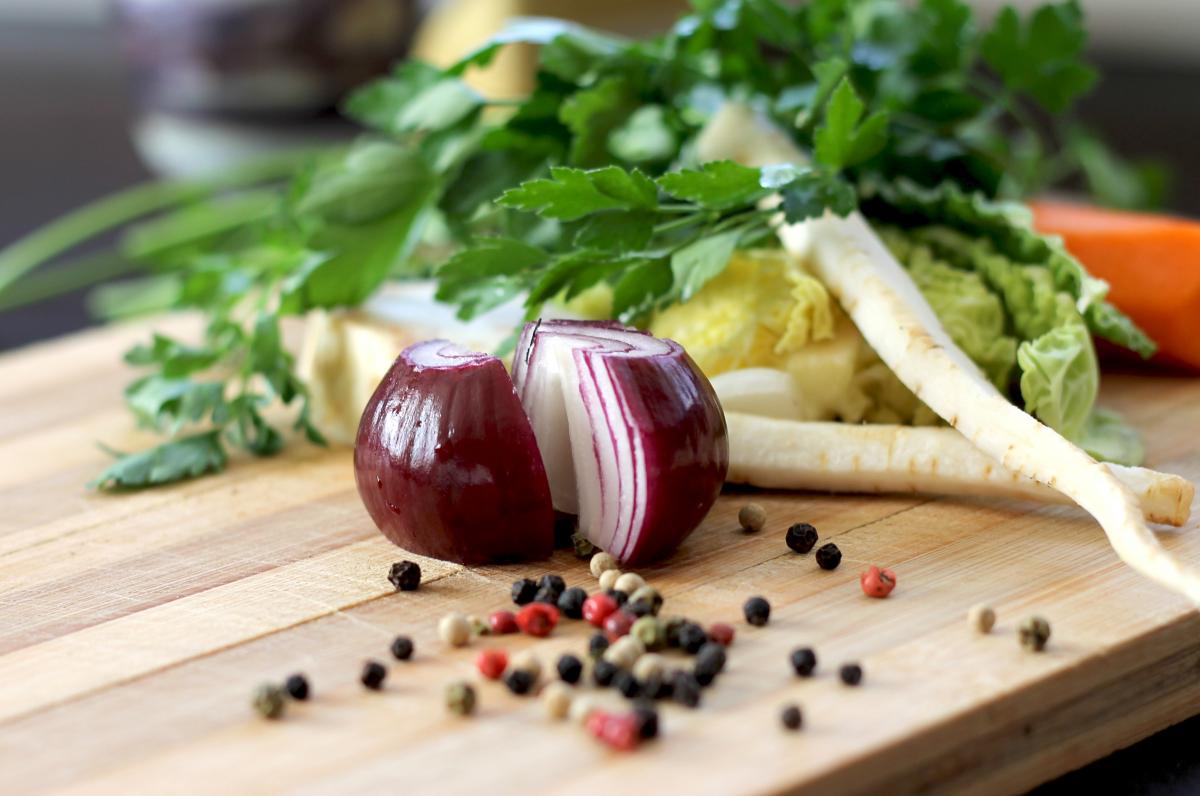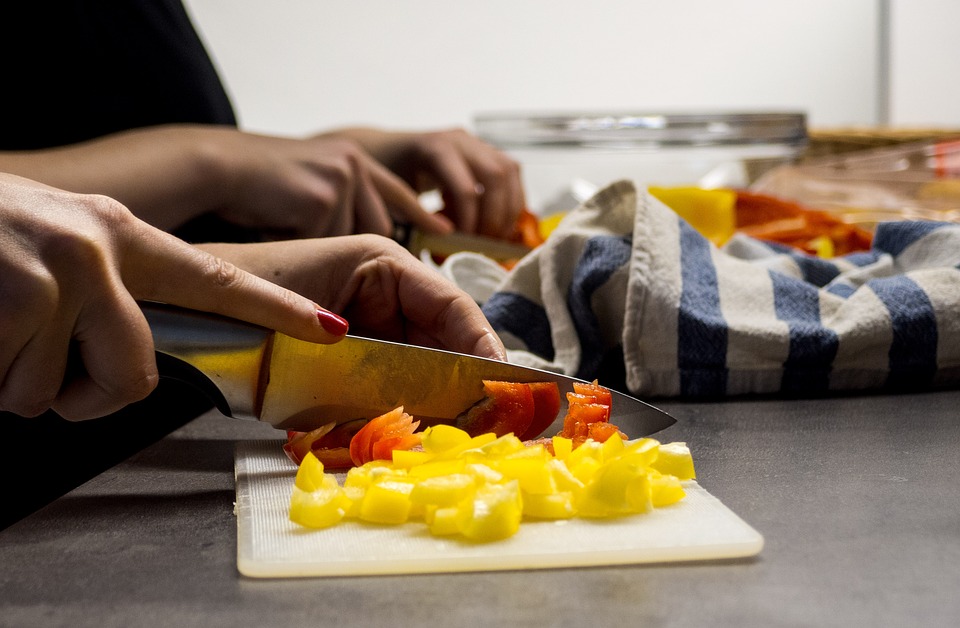Dietitian at The Vegan Society, Heather Russell, discusses the importance of cooking and its wider impact on our wellbeing.
This month, I attended a debate run by the Centre for Food Policy entitled ‘What will get people cooking again?’ Cooking isn’t my forte, but I enjoy spending time preparing food, and strongly believe that this activity empowers us to look after our wellbeing. This debate got me thinking about the promotion of a strong food culture within the vegan community, and the positive influences of vegan cooking on wider society from ethical, environmental and health perspectives.
Rise of the vegan takeaway
One the of speakers highlighted that the online food order and delivery service Just Eat had just entered the FTSE 100, demonstrating that takeaway food is big business. It’s not hard to believe when you walk down certain high streets. I sometimes find myself wondering ‘How do they all make a living?’, but I guess that the answer is simple. Many people pay a business to prepare food for them on a regular basis.
Since I started my vegan journey less than three years ago, the number of veggie takeaways close to my home has tripled. Whilst it’s great to watch veganism going mainstream, I can’t help but wonder how the normalisation of convenience food is affecting vegan health. When you eat this food, nutritionally, you’re no longer in the driving seat. Many vegan takeaway options are high in fat, sugar and salt. If you eat out on a regular basis, and often buy takeaways and highly processed food from the supermarket, you can end up eating a really poor quality vegan diet, missing out on the health benefits that plant foods offer, and falling short of nutritional targets.
Fancy versus no-frills food
One of my favourite discussion points within the debate was the importance of how cooking is portrayed. When I’m providing information about nutrition, I try to keep in mind the foods available in the small supermarket where I do most of my shopping. People can be put off when recipes are long-winded and packed full of unfamiliar ingredients. There may also be unhelpful emphasis on achieving a perfect result. However, thankfully, there are numerous no-frills vegan recipes and videos out there demonstrating just how easy it can be to prepare healthy and yummy meals from scratch.

Cook for the planet
During the debate, it was proposed that environmental concerns could drive a cooking revolution. This summer, over 10 000 people signed up to Plate Up for the Planet for a week by eating vegan. The Vegan Society has been working hard to get environmentalists talking about the impact of animal farming, and a desire to protect the planet is motivating many of us to adopt plant-based diets.
The UK’s Eatwell Guide encourages increased consumption of legumes (beans, peas and lentils), but how familiar are people with cooking them? The Grow Green II report highlights that this is an area for improvement, and recommends legume-friendly policy changes that could transform plant protein agriculture and public catering in the UK, and help us to tackle climate change.
Why children should learn about vegan cooking
This debate highlighted that there is much room for improvement regarding the delivery of home economics education in the UK and beyond. Lessons that aim to give children the confidence to prepare entirely plant-based meals can incorporate the following valuable topics:
- Budgeting – legumes represent nutritional value for money
- Beliefs – understanding of why people choose to avoid animal use as much as possible
- Health – beneficial effects of plant foods on conditions that are common within our society, such as heart and blood vessel disease
- Sustainability – the importance of a shift away from animal farming
Community spirit
The debate drew attention to the roles of teachers and community leaders in helping to upgrade the status of cooking amongst children and families. However, you don’t need to be one to influence the lives of people living around you. A simple gesture, like preparing an afternoon tea for a neighbour, or throwing a dinner party for friends, provides a wonderful opportunity to share food and make memories. One of the advantages of vegan food is that it can be enjoyed by most people – an inclusive option.

Beyond cooking skills
If we are to safeguard the art of cooking for future generations, it’s not just health and education policies that need to be supportive. We need to remove barriers, which includes protecting home life by ensuring that people have the living conditions and resources required to live well.
We also need to nurture positive relationships with food. One of the speakers highlighted that something as simple as learning to bake bread can improve mental wellbeing. Whether it’s herbs on the windowsill or strawberries in a terracotta pot, growing edible plants is also deeply rewarding.
Time-poor society
Whilst discussing cooking, it’s necessary to recognise that many people find themselves able to dedicate only a limited amount of time to this activity. Here are some tips about improving food experiences for people with busy lives:
- Dining table: If you’re living in a home without a dining table, or yours is not being used for mealtimes, could you start to eat at a table during the festive period? It’s good for your posture, and if you live with others, it can greatly enhance the social side of mealtimes.
- Television and other screens: How many hours a week do you spend in front of a screen? Would it be possible to reduce your screen time and spend more time in the kitchen? Better yet, turn on the radio and boogie or sing whilst you cook! Also, ensure that eating is a mindful experience, free from screen-related distractions.
- Legumes: Not only are legumes affordable, sustainable, ethical and healthy sources of protein, they can also be super convenient. Canned beans, chickpeas and lentils, and frozen soya beans, broad beans and peas, are just some of the widely available ready-to-eat/heat options.
Giving a cookbook this Christmas?
If you’ve bought a friend or family member a book full of vegan recipes, it’s the perfect opportunity to share your love of food by spending time together in the kitchen. You might enjoy preparing the food as much as you enjoy eating it, and you’ll be doing your bit to promote the value of vegan cooking in our society.
I’m really pleased that the Centre for Food Policy got people talking about cooking this December, and I hope that you feel inspired to enrich 2018 with delicious and nutritious vegan meals.
by Heather Russell
Dietitian
The views expressed by our bloggers are not necessarily the views of The Vegan Society.


Comments
Training chefs